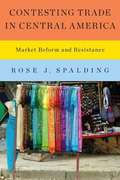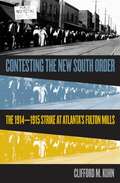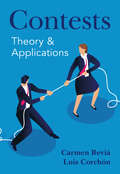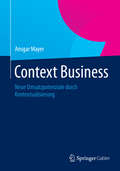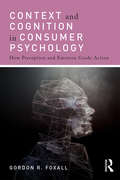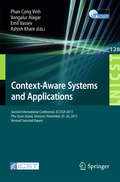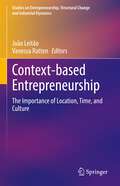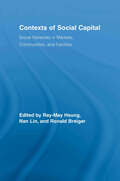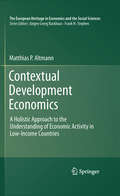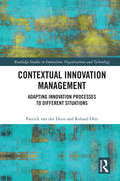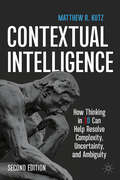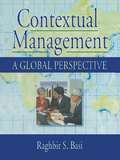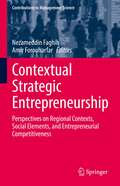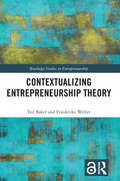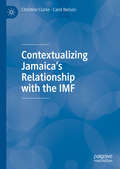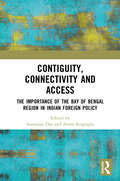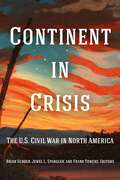- Table View
- List View
Contesting Trade in Central America: Market Reform and Resistance
by Rose J. SpaldingIn 2004, the United States, five Central American countries, and the Dominican Republic signed the Central American Free Trade Agreement (CAFTA), signaling the region's commitment to a neoliberal economic model. For many, however, neoliberalism had lost its luster as the new century dawned, and resistance movements began to gather force. Contesting Trade in Central America is the first book-length study of the debate over CAFTA, tracing the agreement's drafting, its passage, and its aftermath across Central America. Rose J. Spalding draws on nearly two hundred interviews with representatives from government, business, civil society, and social movements to analyze the relationship between the advance of free market reform in Central America and the parallel rise of resistance movements. She views this dynamic through the lens of Karl Polanyi's "double movement" theory, which posits that significant shifts toward market economics will trigger oppositional, self-protective social countermovements. Examining the negotiations, political dynamics, and agents involved in the passage of CAFTA in Costa Rica, El Salvador, and Nicaragua, Spalding argues that CAFTA served as a high-profile symbol against which Central American oppositions could rally. Ultimately, she writes, post-neoliberal reform "involves not just the design of appropriate policy mixes and sequences, but also the hard work of building sustainable and inclusive political coalitions, ones that prioritize the quality of social bonds over raw economic freedom. "
Contesting the Corporation
by Peter Fleming André Spicer Peter Fleming André SpicerIn an age when large corporations dominate the economic and political landscape, it is tempting to think that their power goes largely unchecked. Originally published in 2007, Contesting the Corporation counters this view by showing that today's corporations are driven by political struggle, power plays and attempts to resist control. Building on a wide range of theoretical sources, Fleming and Spicer present an analysis of the different ways in which power operates within the modern workplace. They begin by building a theoretical perspective that synthesizes previous investigations of power and resistance, identifying struggle as a key concept. Each chapter illustrates a different dimension of workplace struggle through an array of original empirical studies relating to sexuality, cynicism, new social movements and new-wave trade unionism. The book concludes by demonstrating that social justice claims underlie even the most innocuous forms of resistance, helping to transform some of the largest modern corporations.
Contesting the New South Order
by Clifford M. KuhnIn May 1914, workers walked off their jobs at Atlanta's Fulton Bag and Cotton Mills, launching a lengthy strike that was at the heart of the American Federation of Labor's first major attempt to organize southern workers in over a decade. In its celebrity, the Fulton Mills strike was the regional contemporary of the well-known industrial conflicts in Lawrence, Massachusetts, and Ludlow, Colorado. Although ultimately unsuccessful, the strike was an important episode in the development of the New South, and as Clifford Kuhn demonstrates, its story sheds light on the industrialization, urbanization, and modernization of the region.Drawing on an extraordinary collection of sources--including reports from labor spies and company informants, photographs, federal investigations, oral histories, and newly uncovered records from the old mill's vaults--Kuhn vividly depicts the strike and the community in which it occurred. He also chronicles the struggle for public opinion that ensued between management, workers, union leaders, and other interested parties. Finally, Kuhn reflects on the legacy of the strike in southern history, exploring its complex ties to the evolving New South.
Contests: Theory and Applications
by Carmen Beviá Luis CorchónContest theory is an important part of game theory used to analyse different types of contests and conflicts. Traditional microeconomic models focus on situations where property rights are well defined, and agents voluntarily trade rights over goods or produce rights for new goods. However, much less focus has been given to other situations where agents do not trade property rights, but rather fight over them. Contests: Theory and Applications presents a state-of-the art discussion of the economics of contests from the perspective of both core theory and applications. It provides a new approach to standard topics in labour, education, welfare and development and introduces areas like voting, industrial organisation, mechanism design, sport, and military conflict. Using elementary mathematics, this book provides a versatile framework for navigating this growing area of study and serves as an essential resource for its wide variety of applications in economics and political science.
Context Business: Neue Umsatzpotenziale durch Kontextualisierung
by Ansgar Mayer,,Dieses Produkt könnte Ihnen auch gefallen. " Die Mechanismen, die hinter diesen bekannten Empfehlungen liegen, werden immer treffsicherer und sind ein guter Hinweis darauf, wohin sich Dienstleistung und Handel in den nächsten Jahren bewegen: Dank Big-Data-Auswertungen werden Kundenprofile so exakt wie nie zuvor. Kunden im Digitalzeitalter sind fortwährend am Vergleichen und Recherchieren, erhalten Kaufempfehlungen auf verschiedenen Plattformen, nutzen Preisvergleiche und Testtabellen und halten sich nicht zuletzt an die Empfehlungen von Freunden. Dank Mobile sind all diese zusätzlichen Kanäle immer und überall nutzbar. Die neue Erfolgsstrategie lautet deshalb ,,Context Business": Der Kunde muss zu 360 Grad im Kontext seiner Entscheidungen erfasst werden: Wo befindet er sich? Was sind seine Vorlieben und Vorerfahrungen? Wem vertraut er? Dank neuer Software-Lösungen werden Produkte und Dienstleistungen immer kontextualisiert sein und sich optimal in das Leben jedes Nutzers fügen. Das Marktforschungsunternehmen IDC ermittelte: Europaweit werden Unternehmen bis 2018 dank Big Data einen Umsatz von 70 Milliarden Dollar erzielen. Für die Zukunft gilt: Ohne Context kein Commerce.
Context and Cognition in Consumer Psychology: How Perception and Emotion Guide Action
by Gordon FoxallContext and Cognition in Consumer Psychology is concerned with the psychological explanation of consumer choice. It pays particular attention to the roles of perception and emotion in accounting for consumers’ actions and their interaction with the desires and beliefs in terms of which consumer choice is frequently analyzed. In this engaging book, Gordon Foxall extends and elaborates his theory of consumer action, based on the philosophical strategy of Intentional Behaviorism. In doing so, he introduces the concept of contingency-representation to explore the ways in which consumers mentally represent the consequences of past decisions and the likely outcomes of present consumption. The emphasis is on action rather than behavior and the manner in which the intentional consumer-situation, as the immediate precursor of consumer choice, can be reconstructed in order to explain consumer actions in the absence of the environmental stimuli required by behaviorist psychology. The result is a novel reaffirmation of the role of cognition in the determination of consumer choice. Besides the concept of contingency-representation which the author introduces, the analysis draws upon psychoanalytic concepts, theories of cognitive structure and processing, and the philosophy of perception to generate a stimulating synthesis for consumer research. The book will be of interest to students and researchers in consumer behavior and economic psychology and to all who seek a deeper interdisciplinary understanding of the contextual and cognitive interactions that guide choice in the market place.
Context and Semantics for Knowledge Management: Technologies for Personal Productivity
by John Davies Paul Warren Elena SimperlKnowledge and information are among the biggest assets of enterprises and organizations. However, efficiently managing, maintaining, accessing, and reusing this intangible treasure is difficult. Information overload makes it difficult to focus on the information that really matters; the fact that much corporate knowledge only resides in employees' heads seriously hampers reuse. The work described in this book is motivated by the need to increase the productivity of knowledge work. Based on results from the EU-funded ACTIVE project and complemented by recent related results from other researchers, the application of three approaches is presented: the synergy of Web 2.0 and semantic technology; context-based information delivery; and the use of technology to support informal user processes. The contributions are organized in five parts. Part I comprises a general introduction and a description of the opportunities and challenges faced by organizations in exploiting Web 2.0 capabilities. Part II looks at the technologies, and also some methodologies, developed in ACTIVE. Part III describes how these technologies have been evaluated in three case studies within the project. Part IV starts with a chapter describing the principal market trends for knowledge management solutions, and then includes a number of chapters describing work complementary to ACTIVE. Finally, Part V draws conclusions and indicates further areas for research. Overall, this book mainly aims at researchers in academia and industry looking for a state-of-the-art overview of the use of semantic and Web 2.0 technologies for knowledge management and personal productivity. Practitioners in industry will also benefit, in particular from the case studies which highlight cutting-edge applications in these fields.
Context for Success: Setting the Stage
by Richard LueckeCreating the right environment in which effective decisions can be made, otherwise known as the context, can sometimes be an uphill battle. This chapter illustrates why the right context is so important to decision making, and it explains why this is an important first step in making better decisions.
Context-Aware Communication and Computing: Applications for Smart Environment (Springer Series in Wireless Technology)
by Ramjee Prasad Punnarumol TemdeeThis book introduces context-aware computing, providing definitions, categories, characteristics, and context awareness itself and discussing its applications with a particular focus on smart learning environments. It also examines the elements of a context-aware system, including acquisition, modelling, reasoning, and distribution of context. It also reviews applications of context-aware computing - both past and present - to offer readers the knowledge needed to critically analyse how context awareness can be put to use. It is particularly to those new to the subject area who are interested in learning how to develop context-aware computing-oriented applications, as well as postgraduates and researchers in computer engineering, communications engineering related areas of information technology (IT). Further it provides practical know-how for professionals working in IT support and technology, consultants and business decision-makers and those working in the medical, human, and social sciences.
Context-Aware Systems and Applications: Second International Conference, ICCASA 2013, Phu Quoc Island, Vietnam, November 25-26, 2013, Revised Selected Papers (Lecture Notes of the Institute for Computer Sciences, Social Informatics and Telecommunications Engineering #128)
by Emil Vassev Phan Cong Vinh Vangalur Alagar Ashish KhareThis book constitutes the thoroughly refereed proceedings of the Second International Conference on Context-Aware Systems and Applications, ICCASA 2013, held in Phu Quoc Island, Vietnam in November 2013. The 36 revised full papers presented were carefully selected and reviewed from over 100 submissions and cover a wide spectrum of issues in the area of context-aware systems (CAS) and context-based recommendation systems.
Context-Marketing: Der Schlüssel zum Verbraucherverhalten
by Ralph Ohnemus Uwe H. Lebok Florian KlausIn Zeiten der Zuvielfalt wird das Konsum- und Entscheidungserhalten der Menschen immer intuitiver, automatisierter und weniger differenziert. Auch die Markenwahl erscheint sprunghafter und das Kaufverhalten der Verbraucher wirkt illoyal. Rückt aber der Kontext einer Entscheidungssituation in den Fokus der Betrachtung, lässt sich nachweisen, dass sich die Konsumenten weiterhin durchaus konsistent verhalten. Alltagskontexte steuern über den Autopilot menschliche Entscheidungen und öffnen dadurch Verbraucher schneller für Marken. Consumer Insights sind deshalb heute ohne Context Insights nur die Hälfte wert. Dieses Buch zeigt anhand von Best-Practice-Beispielen neue Wege für erfolgreiche Markenführung trotz Informationstsunami und digitaler Schnelllebigkeit auf. Alltagskontexte und neueste Forschungsergebnisse der Behavioral Economics werden berücksichtigt. Die Praxisperspektive von Marketingexperten aus Agenturen, Beratungen und Unternehmen steht im Vordergrund und faszinierende Erkenntnisse und vielversprechende Ansätze helfen, Marken mittels Context-Marketing für die Zukunft relevanter und marktwirksamer zu entwickeln. Branchenübergreifende Markenerfolgsbeispiele sowie ausgewählte Expertenbeiträge aus Zukunftsforschung, Digitalmarketing, Sozialpsychologie und Kommunikationsdesign runden das Werk ab.
Context-based Entrepreneurship: The Importance of Location, Time, and Culture (Studies on Entrepreneurship, Structural Change and Industrial Dynamics)
by João Leitão Vanessa RattenContext plays an important role in entrepreneurship and this is increasingly being acknowledged both in research, practice, and policy considerations. Where, why, and how entrepreneurship occurs can be considered when studying the effects of context. This book focuses on the role of context in entrepreneurship by analyzing different factors, including locational, time-specific, and cultural variables and social conditions. Researchers of entrepreneurship will particularly benefit from the holistic, context-based perspective this book offers.
Contexts of Social Capital: Social Networks in Markets, Communities and Families (Routledge Advances in Sociology)
by Ray-May Hsung Nan Lin Ronald L. BreigerThe concept of social capital refers to the ways in which people make use of their social networks in "getting ahead." Social capital isn’t just about the connections in networks, but fundamentally concerns the distribution of resources on the basis of exchanges. This volume focuses on how social capital interacts with social institutions, based on the premise that markets, communities, and families are the major contexts within which people meet and build up social networks and the foci to create social capital. Featuring innovations in thinking about exchange mechanisms, resource distribution, institutional logics, resource diversity, and the degree of openness or closure of social networks, these chapters present some of the most important advances in this essential field. Paralleling these theoretical developments, the chapters also improve practical methodological work on social capital research, using new techniques and measurement methods for the uncovering of social logics.
Contextual Development Economics: A Holistic Approach to the Understanding of Economic Activity in Low-Income Countries (The European Heritage in Economics and the Social Sciences #8)
by Matthias P. AltmannPoverty still persists in today's low-income countries despite decades of international aid, and extensive research on the determinants of growth and development. The book argues that meeting this challenge requires a holistic understanding of the context-specific factors that influence economic behavior and structures in poor countries. Contextual Development Economics approaches this task by offering a methodology that allows analysing the dynamic interrelations between economic, cultural and historical determinants of economic life in low-income countries. The book starts with an empirical inquiry into the economic characteristics of low-income countries that create the context by which the specific forms of organising economic activity in these countries are determined. It then looks at how different generations of development economists sought to explain economic realities in low-income countries from the 1940s through today. The book finally synthesises the results from this empirical and methodological analysis with insights from an inquiry into contributions of the German Historical School, from which it borrows the concept of the economic style as a methodological alternative to the universal and hence often irrelevant models of mainstream development economics. This book offers a promising perspective for the future of development economics that will be of interest to researchers and development practitioners alike. It will also be relevant for academics and students with an interest in applications of the method and concepts of the Historical School to contemporary problems.
Contextual Embeddedness of Women's Entrepreneurship: Going Beyond a Gender Neutral Approach
by Adam Lindgreen Colette Henry Shumaila Y. Yousafzi Saadat SaeedContextual Embeddedness of Women’s Entrepreneurship brings together a range of research that provides powerful insights into the influences and restraints within a diverse set of gendered contexts including social, political, institutional, religious, patriarchal, cultural, family, and economic, in which female entrepreneurs around the world operate their businesses. In doing so, the contributing authors demonstrate not only the importance of studying the contexts in how they shape women’s entrepreneurial activities, but also how female entrepreneurs through their endeavours modify these contexts. Collectively, the edited collection’s studies make a substantial contribution to the contextual embeddedness of women’s entrepreneurial activity, provide numerous insights, and provoke fruitful directions for future research on the important role of the contexts in which women’s entrepreneurial activities take place. This innovative and wide-ranging research anthology seeks to reframe and redirect research on gender and entrepreneurship and will appeal to all those interested in learning more about female entrepreneurship.
Contextual Innovation Management: Adapting Innovation Processes to Different Situations (Routledge Studies in Innovation, Organizations and Technology)
by Patrick van der Duin Roland OrttInnovation has a pivotal role for companies in attaining business survival but making an organization innovative is not straightforward. By determining contextual factors, managers can help decide how to employ a portfolio of innovation management processes. This book explores how contingency influence the management of innovation. Taking the perspective of innovation managers, the authors focus on the decision-making process to demonstrate that different approaches are required depending on the business context. In breaking the process into three levels (culture, industry and company), the book helps choose an optimal innovative approach. With references to real-world innovation cases and organizations, this book will prove useful reading for students and researchers in the field of innovation studies and management.
Contextual Intelligence: How Thinking in 3D Can Help Resolve Complexity, Uncertainty, and Ambiguity
by Matthew R. KutzThis book presents a structured framework for decision-making and leadership in turbulent environments, focusing on the Three-Dimensional (3D) Thinking Framework™—the use of hindsight, insight, and foresight—to navigate complexity. Contextual intelligence helps readers respond to rapid changes in organizational and personal settings. Dr. Kutz&’s 3D Thinking Framework™ and R4 Process™ (recognize, reorder, respond, reflect) integrate past insights, present intuition, and future aspirations into problem-solving strategies. Kutz simplifies complex concepts like VUCA (volatility, uncertainty, complexity, ambiguity), synchronicity, and tacit knowledge into actionable insights. This updated edition offers expanded content, practical examples, and new chapters on behaviors linked to contextual intelligence, enhancing 3D thinking. Full of cases and anecdotes, each chapter concludes with critical thinking questions and tools to assess and enhance contextual intelligence, guiding leaders in mastering complexity and leading with confidence.
Contextual Management: A Global Perspective
by Erdener Kaynak Raghbir S BasiSenior executives, middle managers, supervisors, administrators, and other students of administrative behavior need to know why harnessing human energies demands a full understanding of organizational and cultural contexts combined with a knowledge of personality characteristics--of self and others. In response to this need, Contextual Management: A Global Perspective addresses the art of getting things done in today's organizational world. It offers managers guidelines for working under a varied set of circumstances and explores ways to increase administrative effectiveness in organizations worldwide.Contextual Management integrates different administrative levels and various organizational cultures with appropriate management styles and personal attributes to help you recognize the position context where you can be most effective. Using its self-assessment questions, you can gauge your strengths, weaknesses, and requisites for particular administrative position roles and contexts. You can also use tools from the book's appendix to help you assess personality attributes as well as the characteristics of a particular position context. You will put your individual experiences into perspective and enhance your understanding of organizational realities as you read about:individual managerial behavioral relationshipsorganizational designs, job configurations, and CEO orientationsrecruiting, placing, motivating, and supporting your staffidentifying a particular unit's work culture and recognizing its characteristicswhy a supervisor must be personable to be able to carry out instructions from superiors while gaining allegiance from subordinatesassuring 'good fits’of administrative personnel in various organizational systemsgoals--the logical stepping stones for initiating the process of implementationthe constraints particular work systems place on the relationships between managers and others within an organizationAppropriate styles of performance, as Contextual Management illustrates, are contextual, not universal. The fact that you are effective in one environment doesn't mean you will be effective in another. With this book, though, you can change your thinking about functions of leadership, decision making, communication, planning, and implementation and realize congruence in whichever environmental niche your organization moves into next!
Contextual Strategic Entrepreneurship: Perspectives on Regional Contexts, Social Elements, and Entrepreneurial Competitiveness (Contributions to Management Science)
by Nezameddin Faghih Amir ForouharfarThis edited volume discusses the contextual nature of strategic entrepreneurship. It unfolds the concept of context in strategic entrepreneurship and demonstrates how entrepreneurial strategies differ among various countries, societies, and entrepreneurial ecosystems. Written by global experts in strategic entrepreneurship research, chapters discuss emerging issues in the field such as barriers to strategic entrepreneurship, entrepreneurial resourced-based view, mixed embeddedness, social media marketing, competitiveness in small enterprises, strategic learning, and the triple helix approach to university-business-government strategic cooperation. Affirming that strategic decisions, planning, and formulations are greatly context-related endeavors and hence any true understanding of entrepreneurial strategy starts with appropriate understanding of relevant context, this volume makes a vital contribution to the discussion of strategic entrepreneurship.
Contextualizing Entrepreneurship Theory (Routledge Studies in Entrepreneurship)
by Friederike Welter Ted BakerAs the breadth and empirical diversity of entrepreneurship research have increased rapidly during the last decade, the quest to find a "one-size-fits-all" general theory of entrepreneurship has given way to a growing appreciation for the importance of contexts. This promises to improve both the practical relevance and the theoretical rigor of research in this field. Entrepreneurship means different things to different people at different times and in different places and both its causes and its consequences likewise vary. For example, for some people entrepreneurship can be a glorious path to emancipation, while for others it can represent the yoke tethering them to the burdens of overwork and drudgery. For some communities it can drive renaissance and vibrancy while for others it allows only bare survival. In this book, we assess and attempt to push forward contemporary conceptualizations of contexts that matter for entrepreneurship, pointing in particular to opportunities generating new insights by attending to contexts in novel or underexplored ways. This book shows that the ongoing contextualization of entrepreneurship research should not simply generate a proliferation of unique theories – one for every context – but can instead result in better theory construction, testing and understanding of boundary conditions, thereby leading us to richer and more profound understanding of entrepreneurship across its many forms. Contextualizing Entrepreneurship Theory will critically review the current debate and existing literature on contexts and entrepreneurship and use this to synthesize new theoretical and methodological frameworks that point to important directions for future research.
Contextualizing Jamaica’s Relationship with the IMF
by Carol Nelson Christine ClarkeThis ambitious book provides a comprehensive quantitative and qualitative assessment of Jamaica’s ties to the International Monetary Fund, focusing on Jamaica’s historical relationship with the IMF and reflecting on the domestic and international discourse surrounding the evolution of this relationship. Notably, this volume presents a critical analysis of Jamaica’s first engagement with and departure from the IMF and interrogates the political economy of the period. Jamaica’s economic experiences are assessed in the context of major global events, including the food price crises of 2007 and the global economic crises of 2008 and 2009. This book also looks at policy implications, and its well-researched analysis will be of great value to practitioners and policymakers as well as academics.
Contextualizing the COVID Pandemic in India: A Development Perspective (India Studies in Business and Economics)
by Indrani Gupta Mausumi DasThis book brings together contributions that explore various dimensions of the pandemic from a long-term development perspective. It also analyzes the existing policy responses and the gaps therein, to enable a greater understanding of how public policy – during a pandemic like COVID-19 – can be better aligned with the developmental challenges faced by individuals and households in India. Through its thirteen contributions, the book highlights the connection between the pandemic and development as deep and multilayered, and not unidirectional. It highlights how the existing inequalities and inequities in the system determined who gets impacted and to what extent, and how soon they can recover, if at all. It analyzes policies and programmes that have been implemented based mostly on the immediate pandemic crisis, and responded less to the pre-existing conditions that have shaped socio-economic outcomes. The book would be a great resource to study possible future responses to similar health disasters in a multi-cultural, multi-religion, multi-caste and multi-class melting pot like India.
Contigo hasta la muerte: El arte de cultivar clientes de por vida
by David Gomez GomezMás importante que la venta es la recurrencia Lograr una venta es fácil: baje el precio, ofrezca un beneficio adicional o prometa un servicio extra y el cliente aceptará. Ha sido la fórmula por siglos. Ahora la pregunta es: ¿de qué sirve vender una vez, si el cliente no repite y no nos recomienda? La propuesta de Contigo hasta la muerte es muy sencilla: aprenda cómo pasar de la primera compra a la recurrencia; cómo dejar de pensar en transacciones para pensar en relaciones, y cómo convertir clientes esporádicos en fervientes promotores de su negocio. La forma para lograrlo es simple: cumpla sus promesas y no se pierda del radar. Se llama generar resultados y construir relaciones. Y para cerrar el proceso con broche de oro está el vendedor, quien al mejor estilo de un canciller hace que comulguen dos mundos divergentes en apariencia: el del cliente y el del proveedor. El representante de ventas, o quien desempeñe esa función, es el que lidera la transformación de la relación con los clientes. Convierta un amor de verano (compra esporádica) en un "hasta que la muerte nos separe" (lealtad incondicional). Bienvenido a un mundo maravilloso de longevidad comercial.
Contiguity, Connectivity and Access: The Importance of the Bay of Bengal Region in Indian Foreign Policy
by Anita Sengupta Suranjan DasThis volume examines themes like contemporary factors shaping the emergence of the Bay of Bengal region as a critical strategic theatre in Indian foreign policy; the inter-connectedness of the Indian and Pacific Oceans; the importance of oceans to security and commerce and India’s role within the broader region; the twenty-first century maritime Silk Road and Indian alternatives and the possibilities of reconnecting disconnected spaces through re-imagining a Bay of Bengal Community. In this connection the volume takes particular note of the emerging regional cooperative order for the promotion of peace and development in the Bay of Bengal region (BIMSTEC). The volume brings together historians, political analysts and political economists to emphasize the interconnectedness of the oceanic space through a detailed analysis of the Bay of Bengal as a space of strategic and economic significance, particularly for India, but also as a space for re-imagining a new regional community. Print edition not for sale in South Asia (India, Sri Lanka, Nepal, Bangladesh, Pakistan and Bhutan).
Continent in Crisis: The U.S. Civil War in North America (Reconstructing America)
by Brian Schoen, Jewel L. Spangler, and Frank TowersWritten by leading historians of the mid–nineteenth century United States, this book focuses on the continental dimensions of the U.S. Civil War. It joins a growing body of scholarship that seeks to understand the place of America’s mid-nineteenth-century crisis in the broader sweep of world history. However, unlike other studies that have pursued the Civil War’s connections with Europe and the Caribbean, this volume focuses on North America, particularly Mexico, British Canada, and sovereign indigenous states in the West.As the United States went through its Civil War and Reconstruction, Mexico endured its own civil war and then waged a four-year campaign to expel a French-imposed monarch. Meanwhile, Britain’s North American colonies were in complex and contested negotiations that culminated in confederation in 1867. In the West, indigenous nations faced an onslaught of settlers and soldiers seeking to conquer their lands for the United States. Yet despite this synchronicity, mainstream histories of the Civil War mostly ignore its connections to the political upheaval occurring elsewhere in North America.By reading North America into the history of the Civil War, this volume shows how battles over sovereignty in neighboring states became enmeshed with the fratricidal conflict in the United States. Its contributors explore these entangled histories in studies ranging from African Americans fleeing U.S. slavery by emigrating to Mexico to Confederate privateers finding allies in Halifax, Nova Scotia. This continental perspective highlights the uncertainty of the period when the fate of old nations and possibilities for new ones were truly up for grabs.
